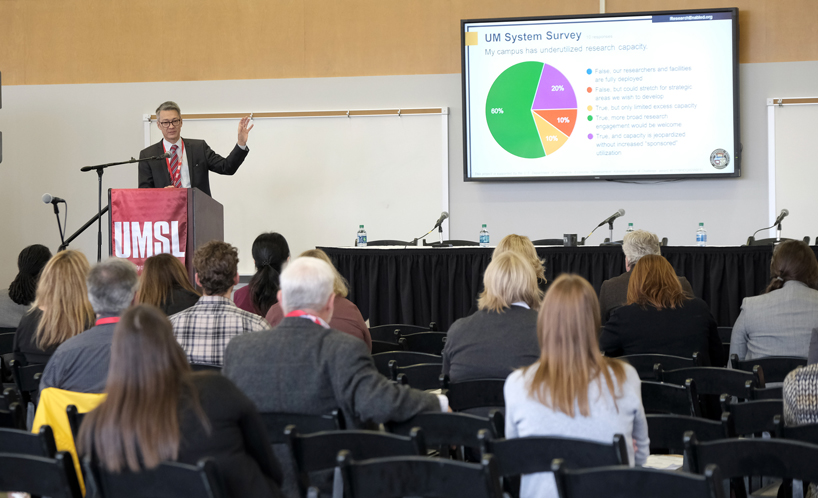
Research Enabled is designed to connect university researchers, experts and resources to the challenges and needs of industry, no matter the company size or challenge.
Research Enabled launched earlier this year with a goal of bringing the talent and expertise of university researchers to bear on problems facing industry in all fields and disciplines.
The online portal allows businesses big and small to come forward with their challenges and receive proposals from researchers trying to meet them.
Research Enabled is a joint initiative of the University of Missouri and the Southern Illinois University Systems, led by the University of Missouri–St. Louis, and remains in the growth stage after being created with a grant from a U.S. Department of Commerce grant.

Director Jay De Long discusses Research Enabled at a UM System Research Summit last November at the Ed Collabitat. (Photo by August Jennewein)
Jay De Long, the director of Research Enabled, encourages all faculty members to log onto the site to accept their profiles and post industry-facing research projects.
“It’s all integrated with the SSO, so you don’t have to create a password or anything,” De Long said. “You just go right to your profile. Your profile is mostly completed using information from the university’s databases, so you don’t have to do much there. You just have to make sure that those things are accurate.”
Faculty members can adjust their settings so that the portal alerts them to any requests for industry-funded research in their specific areas of interest and expertise.
Researchers also will be able to list their investigator-initiated projects and have opportunities to collaborate with other researchers or find industry support for their work.
“Tell everybody what you want to be working on,” De Long said. “Post the research area that you want to be involved in. What projects do you want to do? Develop an abstract and goals and put your flag up to other researchers on campus, other campuses and industry that that you want to collaborate.
“It’s super easy to do. It may take a while, but we won’t waste your time. When you do get notified, it’ll be pertinent.”
More than 550 faculty members across the four UM System universities as well as the Southern Illinois universities in Carbondale, Edwardsville and Springfield have already done so.
The portal has attracted inquiries from several smaller companies, including one looking for research help to better understand the market for their service during and after the COVID-19 pandemic and another looking for an alternative supplier for its medical product.
“At the end, there’s going to be big-dollar contracts that are associated with large companies, and there will probably be more but smaller contracts associated with the medium and small companies,” De Long said. “You’ll have a bunch of Small Business Innovation Research projects, a bunch of materials testing requests for expertise that are smaller contracts.
“It’s about relationship building on both sides of the equation.”
De Long lamented the challenge the pandemic has created for him and his team visiting with faculty researchers and industry collaborators in person to tell them about Research Enabled and show them what the portal can do.
“On the other hand, it makes our value proposition even greater,” he said, “because for companies who have technology development plans or pathways, we help facilitate that without them having to physically go out and do the things they would’ve physically had to do before.
“Most of the universities that are involved, their labs are open again, and those researchers are anxious for more collaboration. We think it’ll be a pretty good fall.”














